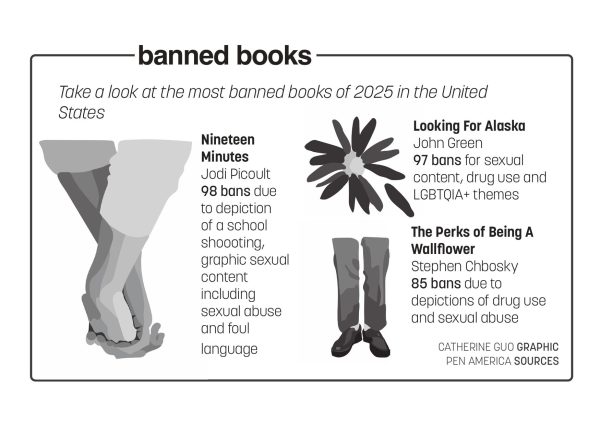The Banned Book Club here at this school takes books such as Of Mice and Men by John Steinbeck and I Know Why The Caged Bird Sings by Maya Angelou and learns from them, regardless of their content.
Sam Falkenstein, president of the Banned Book Club and senior, said reading banned books lets readers gain knowledge and understanding of events and perspectives outside of themselves.
“Reading banned books … (can) potentially broaden their horizons. One of our strongest stances on free speech is that it includes the right to listen to people’s perspectives, which includes reading banned books,” Falkenstein said via email.
But reading these books can also have their drawbacks, according to Falkenstein.
“Many banned books do contain sensitive topics which may be upsetting to certain people, so it’s important to understand the content of a banned book before reading,” she said. “This doesn’t mean staying away from a book because it contains something you don’t agree with, but instead that a person should be aware of a book’s contents before diving into it.”
Club sponsor Grant Benefiel said getting exposed to new perspectives is important. Due to this, he said he is opposed to banning books. Benefiel said when people read the banned books, they are experiencing, reading and learning about different events through various perspectives. Benefiel said that is the main reason why banning literature is hurtful not just to the students around the world, but also to adults.

Benefiel’s not alone. Recent studies conducted by the Michigan Library Association showed that in 2023, 83% of respondents said they should be allowed to read what they want to read. EveryLibrary Institute did a survey in 2024 and the results repeated that 67% of respondents believe that banning books takes away the right to make their own decisions, and 63% said that banning books is just a waste of time.
Lila Walsh, co-president of the Banned Book Club and senior, said that the process of banning books has a lot of moving parts.
“Books are banned on a school-district basis, meaning that they are rarely banned by state or federal governments. Anyone can propose a book ban within a school district, but the most common advocates are parents,” Walsh said via email. “The individual wishing to ban a book submits a form to the board of education, who will then review the content of the book and decide from there whether it should be removed from school shelves or not.”
An important item to note, according to Walsh, is that the Banned Book Club is not meant to change its member’s perspectives or beliefs.
“I would argue that reading banned books more so expands my perspective, as it’s difficult to change someone’s perspective entirely with one written work,” Walsh said via email. “That being said, lots of these books have left a significant impact on me, usually because they show me something I didn’t previously know or wasn’t aware of. That’s my favorite part of reading banned books, they always teach you something you aren’t expecting.”

